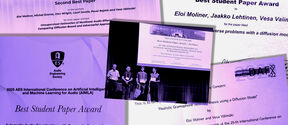Better data leads to better scientific understanding

What are your research topics?
My research group works on networked and embedded sensing systems, focusing on how they can be utilized as tools to support scientific endeavours. These systems are used on devices with network connections and integrated sensors, such as smartphones, environmental sensors, drones, and autonomous vehicles.
Examples of our research include creating data collection, AI, and machine learning methods to enhance data quality, and examining the potential security and privacy risks associated with data use. Ultimately, my research aims to leverage these technologies to advance scientific understanding and provide new and improved research methodologies.
Where and how does the topic of your research have an impact?
Our research primarily impacts empirical-driven analysis by developing innovative methods for collecting scientific measurements. These advancements not only enhance data collection processes but also have significant potential in data-driven decision-making across society, such as in business and policy making. These technologies also have commercial potential, and some of my findings have led to commercial innovations.
What is particularly inspiring in your field right now?
The current excitement in my field surrounds the integration of advanced AI technologies into everyday devices. Modern smartphones already integrate powerful AI assistants, and there are initiatives to bring AI techniques to smartwatches, wearables and other everyday devices.
Personally, I am motivated to explore novel ways to enhance data collection processes, particularly in the context of natural ecosystems, with oceans and aquatic environments being especially close to my heart.
Additionally, the potential for quantum computing in embedded systems fascinates me, as it opens new avenues for research that could revolutionize how we process and analyse data.
This news item was originally published on the University of Helsinki website on 2.12.2024
Read more news
A survey on users' experiences of Mykanta in collaboration between Aalto University and Kela
Senior university lecturer Sari Kujala's research group is exploring, in collaboration with Kela, users' experiences with the Mykanta online patient portal and the MyKanta mobile application.
Specialised AI models could be Finland's next global export
Finland has the potential to build AI solutions that are different from ChatGPT-like large language models. Aalto University's School of Electrical Engineering already has decades of experience in developing specialised, resource-efficient AI models. They could be a key component of future 6G networks, automation, and industrial systems – and the next competitive edge of our country.
Professor Patric Östergård becomes a member of the Finnish Society of Sciences and Letters
Finnish Society of Sciences and Letters is Finland's oldest science academy. It promotes scientific discussion, publishes scientific literature, awards prizes and provides financial support for research.